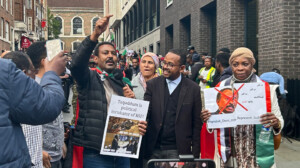Eight people killed in demonstrations in eastern Sudan
After government forces used live ammunition to disperse protestors, eight people were killed, among them a member of the paramilitary Rapid Support Forces (RSF), and 31 others injured in eastern Sudan’s Kassala yesterday.
 The dismissal of the general director of the police is sought in Kassala as victims' families holidng funerals on October 16 call for justice (Social media)
The dismissal of the general director of the police is sought in Kassala as victims' families holidng funerals on October 16 call for justice (Social media)
After government forces used live ammunition to disperse protestors, eight people were killed, among them a member of the paramilitary Rapid Support Forces (RSF), and 31 others injured in eastern Sudan’s Kassala yesterday.
Dozens of people have been detained by security forces.
The acting governor of Kassala, Fathelrahman El Amin, told reporters yesterday that the security committee refused to approve the demonstration, but the demonstrators insisted on holding a rally. He said that at the end of the rally, a group headed to the government secretariat and tried to enter the building. A joint force confronted them. Eight people were shot dead, including an RSF militiaman.
Thousands of people who reject the dismissal of Governor Saleh Ammar marched to Freedom Square in Kassala yesterday, after which they gave the Sudanese government 72 hours to implement their demands, including the dismissal of the prime minister, the return of Ammar to his position, the dismissal of the Secretary General of the Kassala government, and an urgent review of the Eastern Sudan Reconstruction Fund file.
They also insist on fair representation of all communities of eastern Sudan in the institutions of the transitional government and the arrest of the instigators of hate speech, compensation for those affected in the clashes, and the release of those arrested without charge.
Eyewitnesses from Kassala told Radio Dabanga that a joint force of policemen, army troops, and paramilitaries of the Rapid Support Forces fired live ammunition intensively over a number of hours, in order to disperse protesters in various parts of the town.
Security forces also chased protesters through neighbourhoods and down side roads. According to the witnesses, the forces also shot at paramedics, which delayed medical aid for a large number of wounded.
In the evening, the Kassala government declared a State of Emergency for a period of three days. A 18:00-06:00 curfew has been imposed by the Security Committee.
The Resistance Committees and activists made posts on social media, asking for urgent blood donations to Kassala Teaching Hospital, and appealed to medical personnel to go to the hospital to treat the injured.

In Khartoum, dozens of people took part in a protest march in downtown Khartoum, to condemn the shooting of the demonstrators in Kassala.
Protests in eastern Sudan erupted after the dismissal of Saleh Ammar, the disputed governor of Kassala, on Tuesday.
Red Sea
In Port Sudan, capital of Red Sea state, four protestors were wounded in clashes with government forces yesterday, while demonstrating against the dismissal of the governor of Kassala. Roads continue to be blocked in Port Sudan.
Nearby Suakin witnessed a cautious calm after deployment of government forces after protests that took place on Wednesday.
Travel buses resumed their timetable from Port Sudan, escorted by government forces.
The authorities imposed a 12:00-04:00 curfew from yesterday, for all except medical, media, and waste management services personnel, along with emergency staff of the Port Sudan Water Authority and Sea Ports Authority.

GIS deploy forces
The directors of the General Intelligence Service (GIS) and the Military Intelligence briefed Prime Minister Abdallah Hamdok yesterday afternoon about the violence.
They confirmed that more joint police, army and RSF forces will be deployed in Kassala, Port Sudan, and other necessary locations.
Hamdok stressed the need to protect peaceful marches and gatherings as a civilian right. He also stressed the importance of respecting the decisions of state institutions, the Rule of Law, and following the values of the revolution including peace.
The Minister of Information, the official spokesperson for the government, Feisal Mohamed Saleh reported that a cautious calm returned to Kassala yesterday evening, and that the Public Prosecution Office has launched an investigation into the violence in Kassala. He indicated that repeated racial and tribal incitement led to the occurrence of these clashes.
He said that the Sudanese government is keen to respect the right to demonstrate and peaceful assembly, but at the same time the government and security services are working hard to protect people’s lives.
'Poor timing'
The Opposition Beja Congress, the Beja Corrective Congress, and the Popular Front for Liberation and Justice condemned the shooting of demonstrators in Kassala, in separate statements.
Osama Saeed, head of the Opposition Beja Congress, described the timing of the decision to dismiss the governor as “inappropriate”. He denounced the “excessive violence” used by the government forces “to confront peaceful demonstrators”.
Zeinab Kabbashi, President of the Beja Corrective Congress, appealed to all parties to arbitrate the voice of reason. “Let us go back to where we were in the East, to one body.”
The head of the Popular Front for Liberation and Justice, Khaled Idris, called for the dismissal of the Kassala state police chief and an urgent investigation of the state security committee authority firing live bullets at protesters.
“What is happening in the East now cannot be tolerated,” he stated. “How can the revolutionary government, whose motto is Freedom, Peace and Justice, fire live bullets at peaceful protesters?”
Beni Amer nazir Ali Diglel said that what happened in eastern Sudan was due to “political ambition”.
Diglel, the Mak of the Bawadara, Mutwakil Dakeen, the nazirs of the Amra’ar, Ali Mahmoud, and Habbab nazir Kentebay Hamed, called on the protestors to contain the situation.
A coalition of 16 tribal chiefs, members of political parties in eastern Sudan, and youth and women groups, said that the dismissal of Governor Saleh Ammar was issued at the wrong time and inappropriate.
The coalition announced its refusal to declare a curfew in the Red Sea State, warning government forces not to use violence against peaceful demonstrators.
'Govs replaced anyway'
The Vice President of the Sovereign Council, Lt Gen Mohamed Hamdan ‘Hemeti’, said that “according to the Juba Peace Agreement, the current state governors will be replaced anyway.”
In a joint press conference after meeting with eastern Sudanese native administration leaders on Thursday, he said committees will be formed to solve the problem of eastern Sudan by mutual consent.
He said he told the tribal leaders that the eastern Sudan track protocol was signed with an international presence, and that it stipulates the establishment of a Eastern Sudan Consultative Conference by consensus without excluding anyone.
Hemeti called on the eastern Sudanese to show patience and wisdom, and to reject violence and racism.
Radio Dabanga’s editorial independence means that we can continue to provide factual updates about political developments to Sudanese and international actors, educate people about how to avoid outbreaks of infectious diseases, and provide a window to the world for those in all corners of Sudan. Support Radio Dabanga for as little as €2.50, the equivalent of a cup of coffee.












 and then
and then